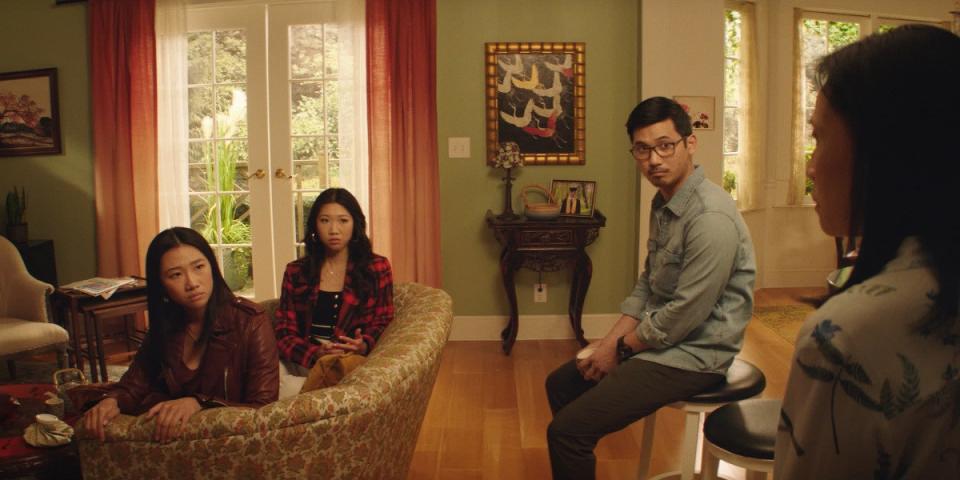Review: Strangely drawn to Asian American stereotypes, 'Kung Fu' stumbles out of gate

What's in a name? The potential to make new deals out of old intellectual property, for one. “Kung Fu,” which premieres Wednesday on the CW, is related by contracts and corporate history to “Kung Fu,” the 1970s David Carradine series about a half-Chinese Shaolin monk roaming the Old West; what they have in common is a main character schooled in martial arts whose mentor is killed. And, apart from a title and a screen credit for Ed Spielman, who created the original series — Christina M. Kim, whose credits include "Blindspot" and "Lost," is the new version's showrunner — nothing else.
In the latest adventure series from Arrowverse honcho Greg Berlanti, Olivia Liang plays Nicky Shen, who spin-kicks things off with a narrated quick trip charting her progress from Harvard college girl to kung fu fighter. Realizing that the “cultural tour” of China on which she’s been sent by her mother is just a dodge to find her a nice Chinese boy, Nicky bolts, jumping into the back of a truck belonging to Pei-Ling Zhang (Vanessa Kai). “You make the path that you live,” says Pei-Ling, who takes Nicky up to the all-female Shaolin monastery she oversees. "These women were warriors," thinks Nicky, watching the lady monks go through their martial arts paces and poses, and signs on.
Three years pass and she is one of them. And then a sudden attack on the monastery, led by a perpetually sneering black-clad beauty (Yvonne Chapman as future nemesis Zhilan), sends Pei-Ling out of this world into the next. But not out of the show: Like Keye Luke in flashbacks in the first series or the wraith of Alec Guinness in the second and third “Star Wars” films, she will pop in to offer encouragement: “You will find the answers because fate has brought you here for a reason," "Faith makes the impossible possible” and so on. As the actress makes a good impression, I support this device.
A magical sword is stolen in the attack, and Nicky, attempting to retrieve it, receives a couple of wounds that will become important later. “Never step in the way of destiny," Zhilan warns her. Our heroine does not lack for advice.
Failing to procure justice for Pei-Ling, Nicky returns "to the place I ran from" — San Francisco, represented by stock shots and the real streets of Vancouver, Canada. She finds welcoming father Jin (Tzi Ma), delighted sister Althea (Shannon Dang), resentful brother Ryan (Jon Prasida) and angry mother Mei-Li (Kheng Hua Tan), who tells her, "My daughter died three years ago."

"That honestly went better than I thought it would," comments Althea, whose computer skills will come in handy before the hour's done. Despite that her fiancé (Tony Chung) is handsome and rich — or rather, because he’s handsome and rich — I have my doubts about him. But perhaps I have just seen too many television shows. And what about that bruise on Father’s face? No one just falls off a ladder in a television drama.
Indeed, in a sort of O. Henry twist, Nicky's parents, who run a restaurant called Harmony Dumplings, have independently gone into debt with a seemingly untouchable local gangster after their rent was raised. With the clock ticking toward a potentially fatal deadline, the young people band together to investigate, reckoning that the oppressed people of Chinatown, wary of unhelpful police, will open up, "because we look like them, speak the same language, live in the same neighborhood."
"One of the few times not being white has its advantages," says Althea.
Nicky also looks up abandoned boyfriend Evan (Gavin Stenhouse), who is white, and is now an assistant district attorney living in the sort of loft space invariably occupied by television’s hipper agents of justice. He's unhappy to see her at first, but just as he's about to pour them a drink, someone enters: “This is Sabine, my girlfriend.” And then there's Henry (Eddie Liu), a handsome tai chi teacher at the community center where med student Ryan works, who is getting his master’s degree in ancient Chinese art history — a most auspicious combination of skills and interests. “You’re a nice looking couple,” an old woman says to Nicky and Henry the moment they meet. Well, they’re all nice looking here.
The pilot — the only episode available for review as of this writing — is a busy, busy thing that packs in a mess of cursory exposition, introductions, family business, romantic groundwork, an operation for a subdural hematoma and a game of ping-pong, at the expense of subtlety and character, while the Asian American setting — a groundbreaking opportunity in its way — feels strangely drawn to stereotypes. (Not unusual for an Arrowverse show, after all.) The episode hints too at the uncanny narrative to come, with attractive explanatory animations; based on the opening hour, and the obvious, almost arbitrary B-movie plotting of its ordinary criminal plotlines, one suspects the series will fare better the more mystical its mysteries become.
And there's the kung fu, of course. The actors called on to marshal martial arts appear, or are made to appear, with edits and camera swoops and slow motion, like they know what they’re doing. As American filmmakers have long since discovered — and often lose sight of in the dust of superheroic musclebound punch-ups — the balletic and gymnastic elements of martial arts lend grace and dignity to fight scenes. It's almost a relief when they come along.
This story originally appeared in Los Angeles Times.

